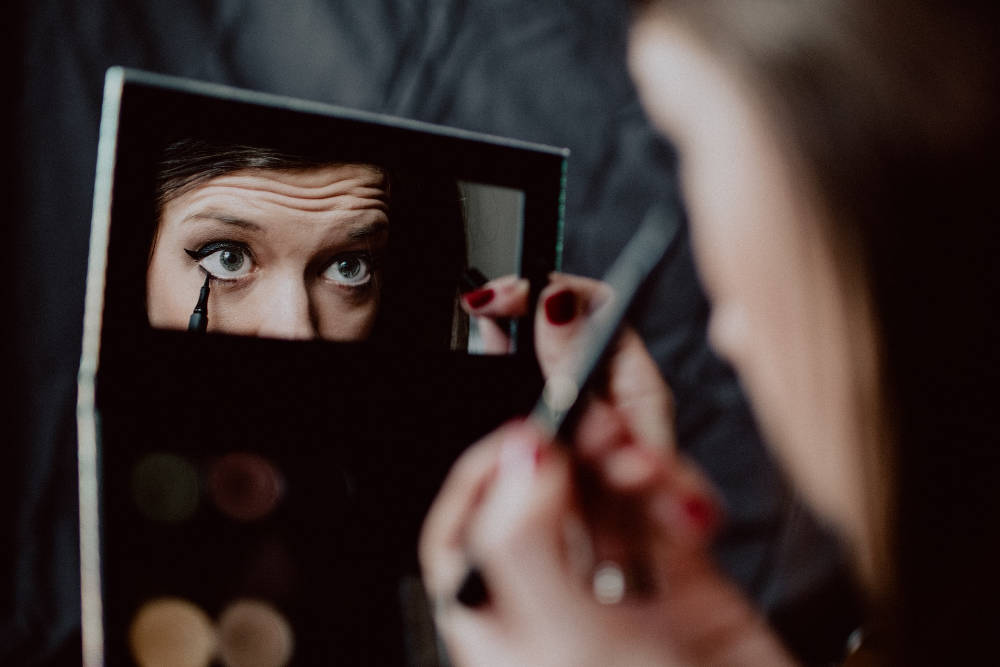[Photo by Kelly Sikkema on Unsplash]
One reason that memes shared on WhatsApp go viral is because they exaggerate how ridiculously funny our lives are on the one hand. And then on the other, they mirror the reality of our lives that we dare not acknowledge in public. By way of example, think of those forwards in recent times that joke about the extent to which people go to look good on a video call and while at work from home.
How large an issue this is made itself obvious the other day when on a whim I typed “How to look…” into Google’s search bar.
One of the top suggestions to complete the sentence was “…good on a video call”. The algorithms that power this search engine have figured millions of people across the world are concerned about how they appear to others.
Now, three-odd months ago, this question may not have occurred to me. But after being compelled to appear on screen practically every day, it was inevitable I see my digital avatar staring back at me. And each time the spotlight turned on me, I could feel myself cringe. While the head imagined a confident creature in control of things, the screen showed me as an unkempt creature, badly in need of a haircut among other things.
As a friend told me after one call, “You must look sharp. Sounding good isn’t enough.” I heard him and pretended not to hear. But truth is, I wanted to look good. To others. And to me. But I was unwilling to do anything about it.
It had to do with a voice in the head that argued, “What’s this obsession with looking good?” Because if the headlines are anything to go by, the economy is in a freefall. People are losing jobs. Household debt is mounting. And most friends say, “Be grateful you have a job to go to.”
Does a narcissist lurk within, whom I haven’t acknowledged? Is that true of everyone else? This, however, is a crude and lazy examination. Because the history of humanity points to one truth—that the urge to look beautiful (or good) is a primal one. And that unlike men, women are unapologetic about it.
To place that in immediate context, during the biggest four-year-long economic crisis that followed the 9/11 terrorist attack in the US, lipstick sales doubled. Then there was the global economic crisis of 2008 triggered by the collapse of Lehman Brothers on Wall Street. Even as people across the world were beginning to wrap their head around the enormity of it all, in 2009, sales of cosmetics in China grew 116%, the highest ever in its history.
Dig deeper into the history of beauty and heart-breakingly sadder narratives emerge. The Yad Vashem Holocaust Remembrance Centre in Jerusalem has a page that documents the life and times of women in concentration camps.
“There is no contrast more glaring than that between Holocaust and womanhood,” the commentary reads.
“…feminity among women was a basic component of personality….. An affront to womanhood was an affront to themselves as complete human beings. By removing women’s hair, including body hair, at Auschwitz, the Nazis deconstructed their personalities.
“Nevertheless—when the murderers photographed women in the ghetto, the objects of the picture suddenly tried to look their best, to lift their heads, to look forward, to straighten their hair. A tiny orange bead embellishes a prisoner’s garment. The woman who placed it there did so in order to feel like a person and not to find favour in someone’s eyes or to be pretty.”
I can only imagine vaguely what they may have gone through after I stepped out of the Dachau Concentration Camp Memorial a few years ago. All that I was left with was a lump in the throat and sadness that cannot be articulated.
My intent is not to equate that horror with our times. But only to suggest that even in the worst of times, the urge to look beautiful is human.
This understanding of the human psyche and the data that he could gather pointed Leonard Lauder, chairman of the Estee Lauder, to an insight many years ago. When times are bad, consumption of inexpensive cosmetics such as lipsticks goes up. Not because it is as an indulgence. To the contrary, it is something the spirit needs when all other indulgences have been stripped out.
His observation still stands to scrutiny. Things look bad. We now wear masks that cover most of our faces. But cosmetics that enhance the eyes such as mascara are up. In post-Covid China, e-tailer Alibaba witnessed a 150% increase in eye cosmetics.
Early reports have it that Indians are not immune to mascara and eyeliners. The Economic Times reports cosmetic manufacturers will shift their attention here as lipstick sales have declined because people have embraced masks.
As for me, I’m unsure what else can I do to enhance how I look other than get a haircut. The wife has jocularly offered to pad the dark circles under my eyes so I “don’t appear as a racoon on video calls”. While I’m tempted to take her up on it one of these days to look better, my colleagues have compiled some pragmatic recommendations on how to look better on Zoom.
I ought to take them up. Because there’s a voice in the head that suggests, this isn’t about vanity, but acknowledging I’m human too.
(Originally published in Hindustan Times)
Still curious? Celebrate your unfair edge. Becasue life and business are built upon unjustly distributed advantages, and there's no reason to disdain only a few of them

